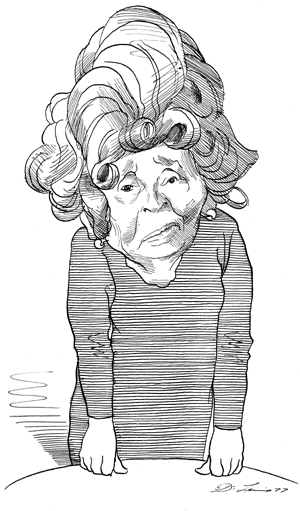In a possibly invented interview with a thesis-writing student, which she put into her most impressive and eccentric book Black Lamb and Grey Falcon, Rebecca West wrote:
I explained that I was a writer wholly unsuitable for her purpose…that I had never used my writing to make a continuous disclosure of my own personality to others, but to discover for my own edification what I knew about various subjects which I found to be important to me…
and concluded that her work “could not fuse to make a picture of a writer, since the interstices were too wide.”
These words were neither modest nor grandly evasive. It is disconcerting, as Mr. Samuel Hynes says in his introduction to this bulky anthology drawn from her writing over six decades, that her work has not “fused” in the mind of her critics, chiefly because her “thinking imagination” has turned to so many different forms of writing. He calls his collection of long extracts a “celebration” and one that her often trenchant gifts certainly deserve. But to have put slices of her novels, her criticism, a witty review or two, her dashing and impressive biographical study of Saint Augustine, episodes from her finest book, Black Lamb and Grey Falcon, and from her well-known reports of the treason trials, and of two notorious murders, abruptly together in one volume is hard luck on their author and confounding to the critic. There is nothing more trying than abridged writing and it is particularly hard on her most ambitious novel about the Russian terrorists: The Birds Fall Down (1966). A short and lesser thing like “The Salt of the Earth” is far more effective in such a collection. Still one admires a thinking imagination and a moralist traveling in history; it is indeed her virtue that she has written for her own edification. For a Women of Letters, as for the male of that restless species, it is important to be on the move and to write for oneself first and foremost.
I have called her a traveler; really she is an invader. Her choice of the name of Ibsen’s heroine as a pseudonym was an invader’s act. A persona is invoked and explores new territory, and shows that the territory was not reserved for men, but was open to a mind that was androgynous. This mind was defined by Virginia Woolf as “resonant and porous;…it transmits emotion without impediment; it is naturally creative, incandescent and undivided.” Whether this kind of mind was rare in 1931 (when Rebecca West said she could think of only a few women who had not accepted masculine values) seems to me doubtful. The only ones she could recollect offhand were Mme de la Fayette, Mme de Sévigné, Jane Austen, Colette, and Willa Cather. I would have thought that Mme de Stael, George Sand, and George Eliot could hardly be said to have affected a masculine mind.
As it developed, Rebecca West’s feminism became less aggressive and more pervasive. Behind the sex war there was her preoccupation with what the psychologists of her period called the “male will-to-die” which leads to poverty, war, and the ruin of civilizations—it had certainly shown this in the Balkan wars and the First World War—and the “female will to live, bear, and nourish.” She allowed, in a story like “The Salt of the Earth,” that the latter had its power politics, its paranoia and destructiveness.
A more important theme came to run through her work. It lies in two questions: What are the foundations of stability and chaos in human societies? What defenses can we build against the strain of evil in ourselves? In her later years, as in her chilled reporting of the treason trials, she has shown herself to be not so much a conservative as a conservationist; but in the bold essay on Saint Augustine, which, whether it pleases scholars or not, is remarkable in its discursive command of the interrelation of private life with religious and political history, she makes her stand for the life-giving and enhancing influences of the imagination.
Her Saint Augustine—the victim of his mother’s feeling for orthodoxy, place, and power—denies his own gifts as a rhetorician and artist, which would have placed him beside Apuleius and Virgil, and becomes the instrument of Rome which has conquered his native Carthage. In his attitude to art he becomes as contemptuous as Tolstoy was after his conversion. This long essay is her most subtle piece of critical and historical writing and offers us the closest view of the allusive richness of her mind. The merely polemical and journalistic “either/or” of her two questions vanishes, before the larger sense of fatality. As she wrote later, “Only part of us is sane; only part of us loves pleasure and the longer day of happiness…. The other half is nearly mad…we are divided against ourselves.”
Advertisement
In her critical essays on Kafka, Lawrence, Joyce, Charlotte Brontë she has been above all the suggestible critic. They have not lost the flash of her arguing metaphors and her responsive personality in the thirty or forty years since they were written. She might be writing so to say in this month’s issue: very few critics hold on to this sense of the instant. By suggestible I mean that she considers both the surface and the geology of the admired writer. She is alive personally because she is digging into real life and art at the same time. Struck by Henry James’s notorious remarks, in his essay on Hawthorne, that America lacked a court that serves as the custodian of a high and traditional culture, she writes:
A disadvantage far less easy to overcome was his lack of a framework for belief in the good, which Fielding found in his world of honest parsons and classical scholars. Henry James’s gospel had to be passed by word of mouth from drawing room to drawing room in the London squares; and there was a curious insubstantiality about the guarantees which could be given in those mansions. He seems to have pinned his faith to the wrong society and got that wrong too. It seems conjectural, in the style of the models of brontosauri and pterodactyls which are constructed in plaster of Paris according to theories derived from the study of fossils. We cannot doubt his thesis that the court saves the courtiers, for the courtiers he shows us are living and are saved, but it is not quite possible to believe in the court.
That is to say, in the Europe he invented. About Charlotte Brontë:
There is nothing to be said against Charlotte’s frenzied efforts to counter the nihilism of her surroundings, unless one is among those who would find amusement in the sight of the starving fighting for food.
In the sphere of life they were unquestionably noble; but it unfortunately happened—and here lies the disconcerting value of Charlotte as a revelation of the artist-type—that in the sphere of art they had a disintegrating effect. They committed her to a habit of activism which was the very antithesis of the quietism demanded from the artist. In her desire to make a place in the world for herself and her family against time, she could let nothing establish itself by slow growth, she had to force the pace of every intimacy and every action, which means that she had constantly to work upon people…. This was Charlotte’s special temptation: she was so used to manipulating people’s feelings in life that she could not lose the habit in her art, and was apt to fall into sentimentality.
If we can gauge Miss West’s criticism, we are at a loss, as I have said, before the mere extracts from her novels in this anthology. Her pace is slow and circuitous. Her pictures of the life that may have gone on in the prosperous late Edwardian houses are bound to strike us as being romantically over-furnished morally and in style. We do not deny that privilege may have a high conscience embalmed in its ornate decor, but the effect is of airlessness and reminiscence. To be fair this has something to do with the passage of time. Two wars have rapidly dated the generations and in any case the extract from her last and most interesting novel, The Birds Fall Down, belongs to her solemnity and does not show the agility and inventiveness in casual scenes. To take one example, one misses her masterly account of a fatal train journey and of what happens when her leading character has a stroke and is lifted out on to a truck while the train goes off. This scene is not only precisely and coolly done, but the gathering of small sinister figures, hidden so far in the central drama of Russian terrorist intrigue, is brilliantly suggested.
The treason trials had, by this time, trained her in the inspection of nastiness and the seedy, and had already drawn out her curious preoccupation with schizophrenia, paranoia, and obsession against which her conservative moral sense put up its fight. This novel has naturally been compared with Conrad’s Under Western Eyes—which itself had a veneer of pastiche. But the scores of minor things and people seen in Rebecca West’s novel, and the portraits of the women, are alive. The women are not seductive; they are seen as persons, tested for will or lack of it, or concealment of it, just as a male novelist would test his men, rarely his women. Particularly the innocent eyewitness, Laura, is a very striking portrait of a girl forced to grow up out of her Alice in Wonderland life and shown to be capable of facing chaos stubbornly when put to it, without any sentimentality.
Advertisement
The extracts from Black Lamb and Grey Falcon show Rebecca West’s idiosyncrasy, her pursuit of historical judgment, and her visualizing powers at their most intricate. Here indeed is Ibsen’s heroine, indefatigable on the road, the eye catching everything, delighting in her personal vagaries. She argues about the sects and races, the perpetual scrimmage of the Balkan cockpit where religion and the Great Powers continually stir up destruction—one might say—while she does her hair or sits soaked by rain in some peasant hut. The book no doubt is an out-of-date classic—and therefore not out of date—and I would have thought her analysis, say, of Dubrovnik’s history, done as if the city were some lamentable and inexhaustible human character, a lasting portrait. Whatever has happened to Yugoslavia since, she brings its passions to life and they simmer there still after a thousand years.
The sprawl of the book is controlled by the author’s vivacity. Here indeed the androgynous mind is porous and incandescent. The distinctive travelers have always sought to be strangers, and Rebecca West fuses most satisfyingly in our minds when we see her in the long line of English women who have thought of themselves, and even their sex, as foreign. Her reviewers, in their time, have suggested comparisons with a number of male forebears. The presiding shade, it seems to me, could well be that learned androgyne, Lady Mary Wortley Montagu.
This Issue
September 15, 1977




